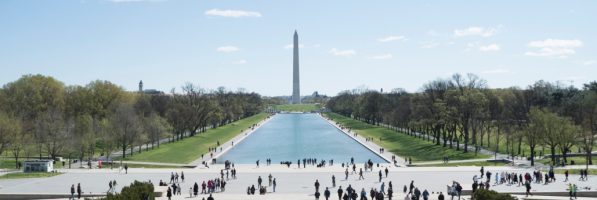Choosing the Best MBA: Philadelphia vs. Washington DC

On the surface, cities like Philadelphia and Washington DC appear to have a lot in common. Both have occupied roles as a center of U.S. history, and have transformed into exciting and ever-changing metros for both established businesses and new startups. If you’re interested in earning an MBA in a top metro area on the East Coast, it might seem impossible to choose between the two.
Even so, Philadelphia and DC offer a number of exciting—but different—kinds of opportunities for up-and-coming business professionals. Between what program you want to pursue and what kind of career you envision yourself in down the line, understanding the differences between top metros can be a crucial part of planning your future. Below, we’ll break down some of the biggest differences in location, programs, and job placement for each metro.
Philadelphia vs. Washington DC: The Differences
For ambitious business students hoping to put their education to work in a government agency, it’ll be hard to beat the nation’s capital for opportunities and experience. Even for those looking outside of the government setting, the DC metro area is home to fifteen companies on the Fortune 500 list, including corporate giants like Exxon Mobile and Walmart. Yet while such heavy hitting companies in the area provide a high earning potential, MBAs will still want to consider the high price of living in DC: currently, the city ranks as the third most expensive place to live in the country.
Check This Out: Searching for the World’s Top MBA Recruiters: Comcast
While Philadelphia may not be the city that pops into your mind as a bustling center of business, research shows the City of Brotherly Love can’t be beat when considering the job market and affordability: a 2016 survey from Adobo found that Philadelphia’s unemployment rate was 20 basis points below the national average, while the average price of a home was at or below 30 percent of the average income. MBA graduates will find no shortage of business opportunities in the city, even among major firms: in 2017, 20 companies in the Philadelphia metro made the Fortune 500 list.
Washington DC’s Full-Time MBA Programs
Featuring more than 35 higher education institutions with post-bachelor business programs, Washington DC is home to some of the top MBA programs in the United States. Fully aware that many of these programs will shape future politicians and government leaders, many of the MBA programs in Washington DC include a focus on integrity and ethics within the global business community.
Full-Time MBA Programs in DC Include:
- George Mason University School of Business
- George Washington University School of Business
- Kogod School of Business – American University
- University of Maryland R.H. Smith School of Business
- McDonough School of Business – Georgetown University
Philadelphia’s Full-Time MBA Programs
When it comes to business schools, Philadelphia is probably best known for The Wharton School at the University of Pennsylvania, consistently named as one of the top business programs in the world. But Philly is also home to a wide range of programs with a variety of specializations. Programs like the full-time MBA at Temple University’s Fox School of Business also offer students to take their education beyond Philadelphia, with international campuses based in Italy, London, and Japan.
Full-Time MBA Programs in Philadelphia Include:
- La Salle University
- LeBow College of Business – Drexel University
- Villanova School of Business
- West Chester University
Cost of MBA Programs
Just as important a factor as cost of living, average cost for an MBA program is an important consideration when choosing where to earn your degree. As expected, top programs in both Philadelphia and Washington DC can come with a high price tag. The average cost estimate for one year at Wharton is $105,265, while tuition at DC’s Georgetown McDonough School of Business is $90,591. The average for each city, however, remains much for affordable: approximately $82,090 for programs in Washington DC, and slightly lower in Philadelphia—schools like West Chester even offer an MBA as low as $21,000 per year.
Job Placement and Salary
With so many incredible companies located in both Washington DC and Philadelphia, MBAs have the chance to earn top salaries that can go a long way in both cities. Depending on the position, MBAs in Philadelphia can make anywhere from $64,665 per year (as a financial analyst) to $104,186 per year (as a senior product manager). In Washington DC, the average salary for an MBA graduate is in the $80,000 range, with employees reporting yearly salaries of $74,758 (operations manager) up to $111,983 (marketing director).
Kogod Professor Explains 3 Cyber Security Misconceptions

Cyber crime costs the world economy about $445 billion every year. According to an industry risk analysis report from 2016, cyber risks ranked third out of the top business risks, already 12 places higher than in just five years ago. Needless to say, cyber security misconceptions become a major concern in the modern business world that needs to be addressed sooner rather than later. Continue reading…
The Secret To Finding An Affordable Washington DC MBA

Washington DC may be a top city for students pursuing their MBAs, but the city’s high cost of living could prove prohibitive for many young Mstudents. Growing rent prices over the past ten years have led DC to be one of the least affordable of the major U.S. metropolitan areas.
Of course, MBA students looking to apply their education to governmental agencies won’t find a better place to do so than in the nation’s capital. And though contending with high rent prices may be unavoidable, many business schools offer students a number of ways to keep the cost of their degree at a minimum.
From scholarships to grants and student work opportunities, business schools in Washington DC ensure that low-income applicants can have equal access to the high quality education their program’s provide. Below are just a few of the opportunities provided to assist low-income applicants at Washington DC MBA programs.
Finding An Affordable Washington DC MBA
McDonough School of Business – Georgetown University
Over $1.5 million in aid is available to MBA applicants through merit based scholarships at Georgetown University’s McDonough School of Business. All students are eligible for these grants, but it is advised to apply for the program early to best position yourself for consideration. International students in need of additional funding may also apply for external scholarships and private loans specifically for international students. The university has compiled a list of common lenders that students may want to consider here.
McDonough also provides scholarship opportunities through the Consortium, a group whose goal it is to reduce the under-representation of blacks, Native Americans, and Hispanic students in business education. As a member school, a number of scholarships are also available at McDonough for students admitted as part of the Consortium.
University of Maryland R.H. Smith School of Business
Roughly 85 percent of MBA students at UMD Smith receive merit based awards to help fund their education. Between scholarships, fellowships need-based awards and assistantship opportunities, students have a number of opportunities to reduce their tuition and keep their MBA affordable. Awards such as the Dean’s Award of Smith award provide two years and one-year of full scholarship and fees. Students may also find additional opportunities for scholarships through the university’s organizational partnerships, such as the Forté Foundation or management Leaders for Tomorrow.
YOU MAY ALSO LIKE: Georgetown McDonough Offers New FinTech Elective
George Mason University School of Business
The George Mason University School of Business provides one of the best values in education, demonstrated through the high success rate of alumni and the fact that Mason alumni have the lowest student loan default rates in Virginia.
Mason offers a number of financial aid opportunities through grants, scholarships, work-study employment, and loans. Every year, the school offers millions of dollars to incoming students, including fellowships for graduate students. The Office of Student Financial Aid is dedicated to assisting each student in finding the financial assistance that is needed for their degree.
George Washington University School of Business
The George Washington University School of Business offers a number of different ways for students to reduce the cost of their MBA degree. Each year, graduate students may apply to a number of different fellowships, available through the university as well as private foundations and agencies. At the Office of Graduate Student Assistantships & Fellowships, students can search through these numerous opportunities and see which scholarships best fit their qualifications.
GWU also offers Financial Aid based on the need of each students. Eligible applicants can apply for need-based aid by filing the Free Application for Federal Student Aid (FAFSA).
Howard University School of Business
MBA students at the Howard University School of Business may be eligible both for federal student aid, based on need, and a variety of scholarships, which are given based on merit and other factors. Scholarships range, and may cover up to full-tuition, while others provide partial funding. Howard MBA students may also pursue loans for tuition through the ACCESS Loan Program, Alternative Education Loans, or other private loan services.
Kogod School of Business – American University
The Kogod School of Business at American University ensures that its high quality education can be affordable for all. Roughly 80 percent of all students receive financial aid of some kind, with almost $85 million awarded just to the undergraduate population. Kogod offers both need-based aid and merit scholarships. Students may contact the Graduate Admission Office at Kogod for more information on the scholarships available to them, but all applicants who demonstrate excellent academic credentials will be considered for these honors—a separate application process is not needed.
3 Washington DC Nonprofit MBA Programs You Need To Know

It’s fair to say that the finance and consulting industries are the most popular for business school grads. But what about non-profits and social enterprises—where do they rank? While some assume that an MBA and working for a nonprofit do not go hand-in-hand, that’s not the case.
According to Fast Company, the nonprofit sector is the third-largest segment of the U.S. workforce, employing more than 13.7 million people at 1.8 million organizations, accounting for 10 percent of the country’s total workforce. The sector is the seventh-largest economy in the world—with combined assets of nearly $3 trillion, the U.S. nonprofit sector is larger than the economies of Brazil and Russia, and its neighbor to the north is taking notice. According to Nonprofit HR, in 2015, 50 percent of nonprofits were hiring compared to just 34 percent of for-profits. Nonprofit wages have also increased by 29 percent between 2000-10 and continue to rise, and exciting jobs in the sector are perfect for MBAs.
Some schools run entire centers and initiatives dedicated to the idea of social change. Other schools offer social entrepreneurship coursework, concentrations and graduate certificates with their MBA program. Here’s our rundown of three nonprofit MBAs in the Washington DC metro.
George Washington University School of Business
Students enrolled in the GWSB MBA program may combine their advanced business degree with a graduate-level certificate. One certificate program offered by the school is the Graduate Certificate in Nonprofit Management. This program is intended for students hoping to advance their careers in the nonprofit sector, as well as students who want to expand their knowledge but who do not want to commit to a master’s degree program.
The certificate requires that students complete 12 credit hours and maintain at least a 3.0 grade point average in order to be awarded the Graduate Certificate. Sample coursework includes:
- PPPA 6031 – Governing and Managing Nonprofit Organizations
- PPPA 6032 – Managing Fund Raising and Philanthropy
- PPPA 6016 – Public and Nonprofit Program Evaluation
- PPPA 6033 – Nonprofit Enterprise
- PPPA 6034 – Managing Nonprofit Boards
- PPPA 6053 – Financial Management for Public, Nonprofit, and Health Organizations
- PPPA 6058 – International Development NGO Management
The Graduate Certificate in Nonprofit Management program is available at the George Washington University’s main campus in downtown Washington DC.. Certificate students enroll in regular courses of the Trachtenberg School and earn graduate credit. Regular graduate tuition and fees apply.
Kogod School of Business – American University
The Kogod School of Business at American University also offers a Graduate Certificate in Nonprofit Management. According to the school, the certificate provides those currently working in the nonprofit sector a program combining both academic rigor and skill set training to enhance their performance in this growing work sector, as well as a foundation for master’s degree students about to enter the field.
The certificate program requires 18 credit hours of approved coursework with at least 9 credit hours at or above the 600-level and encompasses course offerings from the School of Public Affairs, the Kogod School of Business, and the School of Communication, as well as select coursework from the School of International Service and the College of Arts and Sciences.
Sample coursework includes:
- ACCT-607 – Financial Accounting
- FIN-630 – Financial Analysis of the Firm: Concepts and Applications
- COMM-642 – Strategic Communication Management
- MGMT-609 – Management of Organizations and Human Capital
- MGMT-633 – Leading People and Organizations
- PUAD-681 – Managing Nonprofit Organizations
University of Maryland R.H. Smith School of Business
The UMD Smith Dingman Center of Entrepreneurship and Center for Social Value Creation offer several different venues and opportunities for students to explore social entrepreneurship. According to the school, the Center for Social Value Creation was founded in 2009 and aims to educate, engage and empower Smith students to employ business principles that help not just the bottom line, but also the world. You can learn more about the UMD Smith Center for Social Value Creation here.
Students can pitch business ideas with a social mission through the Center’s Pitch Dingman program, or receive support and resources for their own social enterprises. The Center for Social Value Creation offers graduate coursework in social entrepreneurship at both the undergraduate and graduate levels, and leads Social Innovation Fellows, a one-year program that gives Smith School undergraduate students hands-on opportunities to seek innovative solutions for social and environmental challenges through the application of business principles.
To learn more about using your MBA for a nonprofit career, take a look at our “Should MBAs Work in the Nonprofit Sector” post. Check out our list of the top 10 nonprofit MBA programs in the country for even more options and information.
Finding the Best Return on Investment for Your MBA in Washington DC (Part II)

Washington DC is littered with powerful people and exciting opportunities. You could find yourself sitting next to the Fed Chair at the symphony and then running into a Senator at the bar later that evening. So, what better place to start your business education and career than the true seat of power for the entire Western World?
Before investing in an MBA it’s essential to make sure that the school you choose will give you the tools you need to excel in your industry without breaking the bank.
In our first installment to the Washington DC ROI series, we talked about the metro’s schools that give you the greatest bang for your buck. In part two, we delve into even more schools that have topped our list of programs that offer the best return on investment (ROI) for your MBA in DC.
The Best Washington DC Return on Investment (Part II)
Kogod School of Business—American University
With alumni who’ve gone on to positions such as CEO of Goldman Sachs and Executive VP of Turner Classic Movies, it is no secret that Kogod School of Business prepares its students for a range of highly coveted leadership positions. The average starting salary for MBAs is $78,556, which exceeds the $75,166 cost of tuition. Moreover, an average 88 percent MBAs receive job offers within three months of graduation. The full-time MBA is a 49-credit program that lasts for 21 months. Most of the courses are completed during the first year. Kogod’s program includes weekly Business Leadership Luncheons, wherein students can engage in personal conversations with senior executives from companies like Marriott International, IBM, and PayPal.
George Mason University School of Business
At the George Mason University School of Business, students can hone their leadership and management skills while gaining perspective on the intricacies of the ever-changing world of international business. Business school students at Mason can choose to take their classes at either the Arlington or Fairfax campus, both of which are easily accessible from Washington DC. For aspiring MBAs based in Virginia, Maryland, or the capital, this school’s return on investment is undeniable. Residents of the aforementioned areas pay a full tuition of $45,600, and the average salary for graduates is $86,000. Though the tuition is significantly higher for students from outside of Virginia, Maryland, and DC, at $84,072, the significant average salary still makes stellar choice. The 48-credit program involves an optional week-long global residency, offered once students complete the core curriculum. In the past, global residency locations have included places like Singapore, Buenos Aires, and Prague.
Check Out Part 1: Return on Investment – Getting Your Money’s Worth in Washington DC
McDonough School of Business—Georgetown
There is no denying the prestigious reputation of Georgetown’s McDonough School of Business, which was recently named by Forbes as one of 35 best business schools in the U.S. Students in this program have the opportunity to experience real-world work problems through the Global Business Experience, during which they consult with an international company. At the Global Business Conference in DC, students then present their projects to an audience of their peers. A Georgetown degree carries enormous weight, and in recent years the average starting salary for MBA grads has leapt to a remarkable $108,000. The Georgetown name, combined with rigorous curriculum, a prime location in the nation’s capital, and the undeniable financial success of its alumni make McDonough’s overall return on investment undeniable.
Kogod Introduces New Graduate Certificate in Islamic Finance

American University has launched a new graduate certificate at the Kogod School of Business: the Graduate Islamic Finance Certificate.
The new program was founded by Professor Ghiyath Nakshbendi. He held his first Islamic finance conference at Kogod in 2009 and created two classes on the topic afterward. Following feedback from Kogod’s students and faculty, Nakshbendi officially launched the program for the fall 2017 semester.
“This program offers a special opportunity to become an educational leader in the field,” Nakshbendi says. “I’m excited for what lies ahead.”
Students in the Graduate Certificate in Islamic Finance program can expect:
- Business courses, such as Financial Accounting and International Finance
- Economics courses, such as Economics of the World Regions
- Mathematics-focused courses
- Guest lecturers who offer students real-life perspective from the business world
Nakshbendi has an all-star line up of speakers for the program’s inaugural semester, including CEOs, lawyers, and high-profile Islamic finance professionals from Kuwait, Doha-Qatar, and Bahrain. “I make a point of inviting guest speakers who can help my students with job prospects,” Nakshbendi said.
It’s all about networking for Nakshbendi, and he hopes that his program will attracting Islamic finance professionals to Kogod. His “ultimate goal” is that these professionals will bring their work experience and job contacts with them. Nakshbendi told Kogod that he hopes to place his students at places like Citibank or Goldman Sachs.
Along with launching the Graduate Islamic Finance Certificate, Nakshbendi also founded the American Center for Alternative Finance (ACAF), a non-profit that promotes Islamic Finance and other alternative finance methods in the United States.
Through seminars and conferences, ACAF offers students opportunities to network and gain experience outside of the classroom. Nakshbendi says the organizations helps provide “great supplemental experience” for students.
Nakshbendi hopes the Certificate program is a conduit for success. Outcomes are his priority, and he wants to ensure students are flourishing after graduation.
